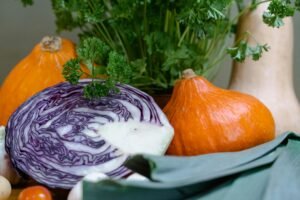Veggies That Begin with B
Eating vegetables is vital for a balanced diet. Among them, veggies that begin with B bring a unique set of nutrients and flavors to your meals. Many people are unaware of how many healthy vegetables start with this letter. Today, we will explore these nutritious choices. You will discover their benefits, uses, and why you should add them to your meals.
Healthy eating is trending everywhere. People search daily for superfoods and vegetables rich in vitamins. You may have heard of some of these B veggies, but many often go unnoticed. Including them in your diet is simple. Plus, they offer exciting flavors for your kitchen.
Let’s dive into this list of nutritious veggies starting with B and how they can boost your health.
Broccoli: A Green Powerhouse
Broccoli tops the list for many reasons. It is packed with vitamins C, K, and A. You will also get fiber and antioxidants with every bite. Broccoli belongs to the cruciferous family, which fights inflammation and promotes heart health.
Many nutrition experts recommend steaming broccoli to retain its nutrients. However, you can roast or sauté it too. Including broccoli regularly may support digestion and improve immunity.
If you love healthy recipes, our guide on easy steamed broccoli recipes will help you.
Brussels Sprouts: Tiny But Mighty
Brussels sprouts may seem small, but they are nutrition-packed. They are also part of the cruciferous family. These mini cabbages contain vitamin K, folate, and fiber. You can roast them for crispy edges or steam them for a softer texture.
Brussels sprouts may also reduce the risk of chronic diseases. They promote better digestion and can improve heart health. Many people now enjoy them in salads and stir-fries. Their slightly bitter taste pairs well with honey or balsamic glaze.
Beets: Nature’s Sweet Root
Beets bring color and nutrition to your plate. They are rich in folate, manganese, and nitrates. Athletes often use beetroot juice to enhance performance. This vegetable boosts blood flow and reduces inflammation.
You can eat beets raw, roasted, or boiled. Beet greens are edible too, offering more fiber and nutrients. Adding beets to your diet may improve heart health and lower blood pressure.
For those who love colorful salads, try this beetroot salad recipe for a refreshing twist.
Bok Choy: The Asian Green Delight
Bok choy, also called Chinese cabbage, is another B veggie to love. It belongs to the cruciferous group and contains vitamins A, C, and K. Bok choy offers calcium and antioxidants as well.
Many Asian recipes include bok choy for its crisp texture. You can stir-fry, steam, or add it to soups. This leafy green boosts immunity and may support bone health. It is low in calories but rich in nutrients.
Bell Peppers: Colorful And Crunchy
Bell peppers bring a burst of color to meals. They come in red, green, yellow, and orange varieties. Bell peppers are rich in vitamin C and antioxidants. Their crisp texture makes them perfect for salads, stir-fries, and snacks.

Many health-conscious individuals love bell peppers for their versatility. They improve eye health and support the immune system. Roasting them enhances their sweet flavor.
For spicy food lovers, check out our post on spicy bell pepper recipes.
Butternut Squash: Creamy And Nutritious
Butternut squash is a winter vegetable with a nutty, sweet flavor. It contains vitamin A, potassium, and fiber. Roasting butternut squash enhances its natural sweetness.
Many recipes include it in soups, purees, or roasted side dishes. Butternut squash supports healthy vision and digestion. Its creamy texture makes it a favorite in fall and winter meals.
Including this veggie boosts your fiber intake. It’s perfect for hearty meals during colder months.
Black Beans: A Plant-Based Protein
Black beans are technically legumes, but many people include them as a veggie source. They provide plant-based protein, fiber, and iron. Black beans help regulate blood sugar and improve digestion.
Vegetarians and vegans love black beans for their protein content. You can add them to salads, soups, and burritos. They are affordable and widely available.
Our article on healthy black bean recipes gives delicious meal ideas.
Broccolini: A Tender Green Option
Broccolini looks like baby broccoli but has longer stems and smaller florets. It contains vitamins A, C, and K. You also get iron and calcium.
Broccolini is tender and cooks quickly. You can sauté, grill, or steam it. It tastes milder than regular broccoli but offers similar benefits.
Including broccolini supports immunity, bone health, and overall wellness. It adds variety to your green veggie options.
Bamboo Shoots: Crunchy And Low-Calorie
Bamboo shoots are common in Asian cuisine. These young, edible shoots contain fiber, potassium, and antioxidants. They are low in calories but high in nutrients.
Many stir-fries, soups, and salads include bamboo shoots. Their crunchy texture adds a unique element to meals. They support digestion and may aid weight management.
For Asian recipe inspiration, visit serious eats bamboo shoot recipes.
Burdock Root:
Veggies That Begin with B
An Ancient Medicinal Veggie
Burdock root has been used for centuries for its medicinal properties. It offers fiber, potassium, and antioxidants. Burdock root supports detoxification and digestion.
You can enjoy it in soups, stews, or stir-fries. Its earthy flavor adds depth to many dishes. Health experts often promote burdock root for liver health.
Including burdock root in your diet may improve skin health and overall wellness.
Butter Lettuce: Soft And Mild
Butter lettuce offers soft, tender leaves with a mild flavor. It contains vitamins A, C, and K. Many salads use butter lettuce for its smooth texture.
This leafy green is low in calories but high in hydration. It makes an excellent base for sandwiches and wraps. Butter lettuce supports hydration and adds nutrients to your meals.

Including leafy greens like butter lettuce boosts your fiber intake and promotes heart health.
Broccoli: The Famous Green Veggie
Broccoli is a top superfood. It contains vitamins C, K, and fiber. This green veggie belongs to the cruciferous family, known for boosting immunity and heart health.
You can steam, roast, or stir-fry broccoli. Steaming keeps the nutrients intact. Many people enjoy it with garlic or cheese.
Broccoli may reduce inflammation and improve digestion. Add it to salads, soups, or enjoy as a snack.
Want more green veggie ideas? Explore our complete list of green vegetables to diversify your meals.
Brussels Sprouts: Small But Nutritious
Brussels sprouts might be tiny, but they’re powerful. These mini cabbages bring vitamin K, folate, and fiber to your plate.
Roasting Brussels sprouts adds a crispy edge. Their slightly bitter flavor pairs well with honey, lemon, or balsamic glaze.
Brussels sprouts support digestion and heart health. They’re popular in modern salads and holiday meals.
You can also check our article on fiber-rich vegetables to learn more about gut-friendly foods.
Beets: Vibrant And Sweet
Beets are colorful root vegetables with many benefits. They are rich in folate, manganese, and antioxidants.
Athletes often drink beet juice to enhance stamina. Beets also improve blood flow and reduce inflammation.
You can roast, boil, or grate beets raw. Beet greens are edible and full of fiber.
Looking for tasty beet ideas? Visit this beetroot salad recipe for a refreshing dish.
Bok Choy: Asian Leafy Green
Bok choy, also known as Chinese cabbage, is a leafy green with crisp stalks. It contains vitamins A, C, K, and calcium.
Many stir-fry recipes use bok choy. It cooks fast and adds crunch to your meals.
Bok choy supports bone health and boosts immunity. It’s low in calories but high in nutrients.
Learn about other immune-boosting veggies in our immunity vegetable guide.
Bell Peppers: Colorful Crunch
Bell peppers add color and crunch to meals. They come in red, green, yellow, and orange. These veggies are rich in vitamin C and antioxidants.
You can slice them raw, roast them, or toss them in stir-fries. Roasted bell peppers taste sweet and smoky.
Bell peppers improve eye health and immunity. They’re perfect for salads, snacks, or cooked dishes.
Want spicy options too? See our article on spicy vegetables for bold flavors.
Butternut Squash: Creamy And Sweet
Butternut squash is a sweet, nutty winter veggie. It contains vitamin A, potassium, and fiber.
Roasting enhances its natural sweetness. Many people use it in soups, purees, and roasted dishes.
Butternut squash supports vision, digestion, and heart health. Its creamy texture makes it popular in comfort meals.
Explore our winter vegetable guide for more seasonal nutrition.
Black Beans: Protein-Packed Legume
Black beans are technically legumes, but many treat them as veggies. They offer plant-based protein, fiber, and iron.
These beans stabilize blood sugar and promote digestion. You can use them in salads, burritos, soups, and more.
Black beans are ideal for vegetarian diets. They’re affordable and filling.
Discover more protein-rich plant foods to support your meals.
Broccolini: Tender Green Stems
Broccolini resembles baby broccoli with long, slender stems. It contains vitamins A, C, K, and minerals like calcium.
Broccolini cooks fast and has a mild flavor. You can steam, sauté, or grill it.
It supports immunity, bones, and overall wellness. Broccolini adds variety to your green vegetable list.
Learn how to cook more low-calorie veggies for weight management.
Bamboo Shoots: Crunchy Asian Veggie
Bamboo shoots are edible young shoots from bamboo plants. They are high in fiber, potassium, and antioxidants.
Why You Should Add B Veggies To Your Diet
Veggies beginning with B offer numerous health benefits. They support digestion, heart health, and immunity. Many of these veggies are low in calories but rich in nutrients.
Including these options brings variety to your meals. You get antioxidants, vitamins, and minerals with every bite. Whether you love crunchy, leafy, or root vegetables, this list has choices for everyone.
Health-conscious individuals know that diverse veggie intake improves wellness. Eating different vegetables ensures you get a wide range of nutrients.
You can learn more about balanced diets in our vegetarian health guide.
Frequently Asked Questions
What are the most nutritious B veggies?
Broccoli, Brussels sprouts, and beets top the list for nutrition. They are rich in vitamins, fiber, and antioxidants. Adding these veggies improves overall health.
Can I eat these veggies raw?
Yes, some of them like bell peppers, beets, and butter lettuce can be eaten raw. Others, such as broccoli and bok choy, may taste better when cooked lightly to retain nutrients.
Are B veggies good for weight loss?
Many B veggies are low in calories but high in fiber. They promote fullness and support weight management. Including them in your meals can help control appetite.
Where can I buy these vegetables?
You can find most B veggies at local grocery stores, farmers’ markets, or health food stores. Some Asian varieties like bamboo shoots or bok choy are available in international markets.
Are B veggies suitable for children?
Yes, many children enjoy the sweet and mild flavors of veggies like bell peppers and butternut squash. Introducing them early encourages healthy eating habits.
Conclusion
Veggies that begin with B provide exciting flavors and essential nutrients. From crunchy bell peppers to earthy beets, these vegetables support better health. Including them in your diet brings variety and promotes wellness.
You can cook them in countless ways. Whether you prefer roasted, steamed, or raw options, B veggies fit every meal plan. They boost immunity, aid digestion, and support heart health.
Don’t miss out on these nutritious choices. Explore your local market and start adding more B veggies to your meals today.
For more healthy eating tips, visit our vegetable nutrition blog.